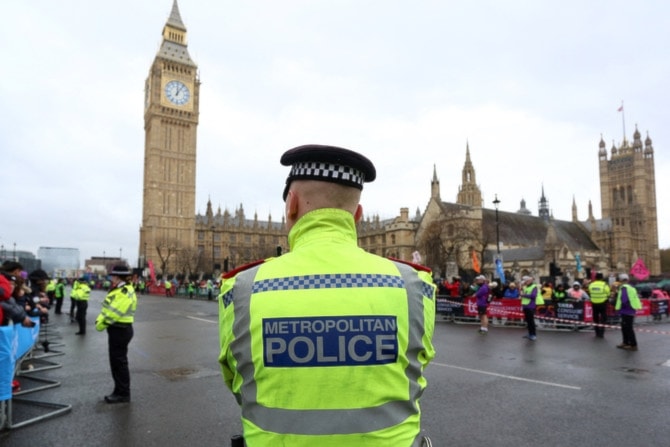Unproven medical terms used by UK police to justify deaths
Since 2005, ABD and “excited delirium” have been listed as the cause of death, or a contributing factor, in police watchdog reports in at least 44 restraint cases.
-

A met police officer stands in front of the Big Ben, in London, UK. (AFP)
The Observer has reported that an unproven medical condition deep in pseudoscience and deemed controversial by doctors is frequently being used in the UK to explain the deaths of people following incidents of police brutality.
“Acute behavioural disturbance” (ABD) and “excited delirium” are the terms used to describe those agitated or acting bizarrely, due to mental illness, drugs, or both, while symptoms are said to be insensitivity to pain, aggression, “superhuman” strength and elevated heart rate.
Police and other emergency services claim the terms help identify when someone needs medical help and when restraint is not recommended, however, they are not acknowledged by the World Health Organization and have been deemed “spurious” by campaigners who say they are used to “explain away” the police role in deaths.
Recently, the American Medical Association denied accrediting the term “excited delirium” after being used by police attorneys in the murder of George Floyd. California lawmakers rejected it as a diagnosis in October, citing it had been “used for decades to explain away mysterious deaths of mostly black and brown people in police custody."
Read next: UK anti-racism police team accused of racism
The Royal College of Psychiatrists additionally warned that the current definition of ABD in the UK could be leading to people “being subjected to avoidable and potentially harmful interventions." Even back in 2017, a Home Office-commissioned review into police custody deaths said they were “strongly disputed amongst medical professionals."
Since 2005, ABD and “excited delirium” have been listed as the cause of death, or a contributing factor, in police watchdog reports in at least 44 restraint cases as per research by the charity Inquest, the Royal College of Psychiatrists, and The Observer.
Encouraging the racial gap and inequality
The executive director of Inquest, Deborah Coles, argued that danger looms in the use of the terms as they risk diverting attention from the “inherently dangerous” use of restraint by police.
She called their uses inappropriate and that they had been used “without any doubt, to try and downplay the significance of the police use of force and explain away the role of dangerous and negligent restraint. That can really undermine effective public scrutiny and accountability."
A study by King’s College London found that the use of the term in mental health environments with references to ABD has been prevalent since 2019 and was twice as likely to be used in assessments of Black people than white, which researchers said “may contribute to existing racial inequalities in the use of coercive measures during crisis presentations."
The Independent Office for Police Conduct has been using both terms in its forms by police forces after a death or serious incident, which asks police to tick relevant factors with the first option given: “Acute Behavioural disorder/excited delirium."
#Britain's police watchdog has called for an explanation for the rampant misogyny and "disgraceful" behavior after a newly published report cited widespread bullying, sexual harassment, and discrimination. pic.twitter.com/VzlZT86Ci0
— Al Mayadeen English (@MayadeenEnglish) February 7, 2022
This week, the IOPC and College of Policing claimed to be reviewing documents to consider whether updates were needed. The College of Policing claimed its guidance was more for presentation not diagnosis and was clear ABD was an “umbrella term”.
It added that its position was informed by guidance from health partners, such as the Royal College of Emergency Medicine.
It suggested that more research was needed to inform national policy, but one main highlight in its training materials on ABD was for officers to “avoid physical restraint unless absolutely necessary for the safety of the subject, self or public."
Read more: Hundreds of UK police face sack over sexual, domestic abuse offenses
The IOPC, meanwhile, said its probes show the need for “clear, well-communicated guidance for police” in identifying cases where medical intervention was dire and restraint posed a “clear and obvious danger."
It also encouraged new research “to better understand how emergency services can respond appropriately and give the correct care," yet stressing that any adjustments “must not undo the progress made."

 4 Min Read
4 Min Read








